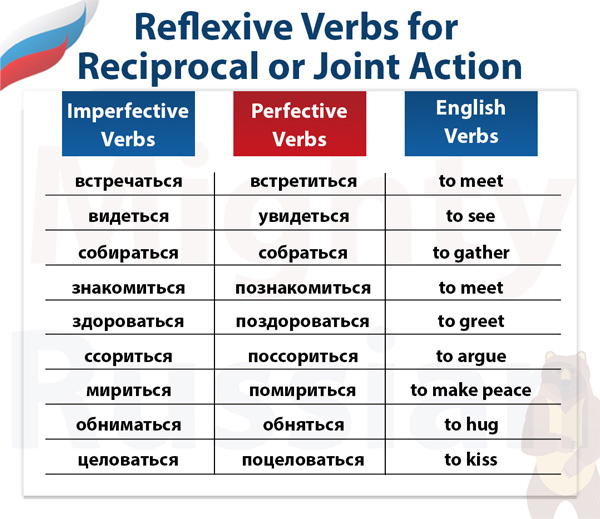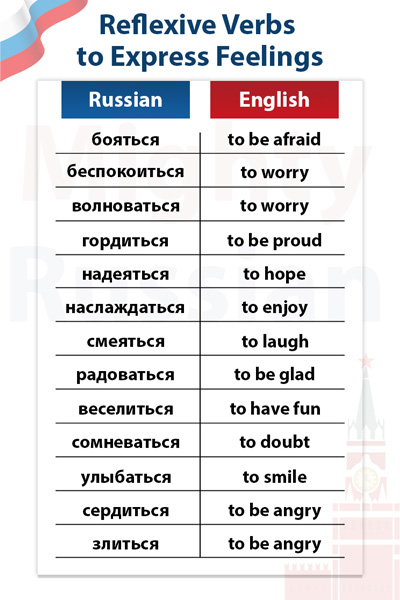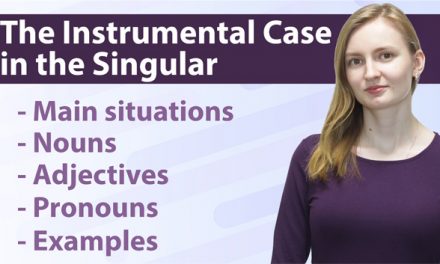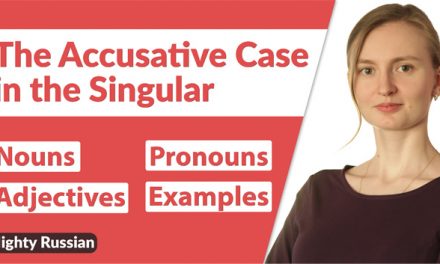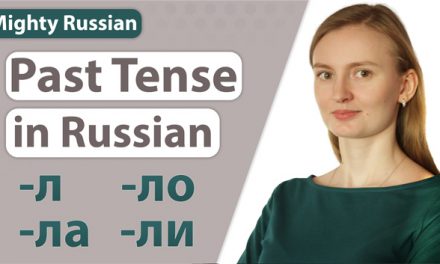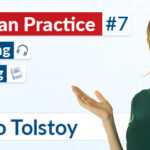It seems that you are looking at an outdated version of this lesson.
Click here to see the latest version of it, which includes examples with audio, integration with our dictionary and exercises.
Reflexive Verbs in Russian
Reflexive Verbs are very important in the Russian language and there are many situations in which they are used.
In this lesson, you will learn everything you need to know about Reflexive Verbs.
To make things easier, I divided the lesson into 3 parts:
2) How to form Reflexive verbs;
3) Most common uses of Reflexive Verbs.
If there is any specific subjec you would like to learn first, you can click on it and go straight to that part of the lesson.
What are Reflexive Verbs?
Reflexive verbs are verbs that are used to talk about things that you do “to yourself”.
Imagine that you perform some action and it goes back to yourself. In other words, it is you who causes the action and it is you who is affected by it.
In English, there isn’t a specific way to express this idea. Sometimes we use Reflexive Pronouns (myself, yourself, etc.), sometimes the verb “get” and sometimes the verb itself.
But in many other languages, such as Russian, there is a specific way to form Reflexive Verbs.
To make sure you understand the idea behind Reflexive Verbs, let’s take a look at some English sentences:
Mary cut the cake (Мэри порезала торт)
Mary cut herself (Мэри порезалась)
In the first sentence, we have “Mary” who is the performer of the action, “cut” which is the action and “the cake” which is the sufferer of the action.
Can you see that the performer of the action and the sufferer of the action are different? “Mary” and “the cake”.
Now, in the second sentence, we have only “Mary” and the action.
The action that she performs goes back to herself. Not only does she perform the action, but she is also affected by it. She did it “to herself”.
Note that in the Russian example, there isn’t any word equivalent to “herself”. Instead, the verb takes a different form.
Мэри порезалась (Mary cut herself)
Another example:
We are preparing the project (Мы готовим проект)
We are preparing for work (Мы готовимся к работе)
In the first sentence, “we” are preparing “the project”, so “we” are preparing another thing.
But in the second sentence, “we” are not preparing another thing. “We” are preparing “ourselves” for work.
Note that this time, the verbs in English are the same and we don’t have any reflexive pronoun. In Russian, however, we still need to change the verb to indicate that the action is reflexive.
Мы готовимся к работе (We are preparing for work)
It’s simple to understand the difference, isn’t it?
So now that you know what Reflexive Verbs are, let’s take a look at how we can form them in Russian.
How to form Reflexive Verbs
Forming Reflexive Verbs is actually very simple.
All you have to do is add “СЯ” or “СЬ” to the end of the verb.
If the verb ends in a consonant, you will add “СЯ”:
Готовиться (To prepare)
Моются (They wash)
Порежется (He will cut himself)
If the verb ends in a vowel, you will add “СЬ”.
This ending is less common. Normally, you will see it only with verbs in the 1st person singular in the present:
Моюсь (I wash)
Одеваюсь (I get dressed)
Умываюсь (I wash my face)
In the 2nd person plural:
Вы собираетесь (You get ready)
Вы причёсываетесь (You brush your hair)
Вы просыпаетесь (You wake up)
Or in the past:
Она готовилась (She was getting ready)
Мы поссорились (We fought)
Они помирились (They made peace)
If you don’t know yet how to use the Past Tense, you can check out our complete lesson about it clicking here.
Note that when there is a reflexive verb in the sentence, you cannot use a direct object (a noun or a pronoun in the Accusative Case).
If you want to use the direct object, you need an ordinary verb (without “СЯ” or “СЬ“):
Я моюсь or Я мою руки
Я учусь or Я учу русский
The Accusative Case is a very important subject in the Russian language. If you still don’t know how to use it, you can check our our complete lesson about it clicking here.
When to use Reflexive Verbs in Russian
We have already learnt that reflexive verbs are used when a person does an action and is also affected by it.
But there are two other situations in which reflexive verbs are very common.
1) Some reflexive verbs express reciprocal or joint action:
Мы познакомились два года назад (We met two years ago)
Они часто ссорятся (They often argue)
Они целуются (They are kissing)
Here are the most common reflexive verbs with this meaning:
The verbs above can be followed by the preposition “С” plus a noun in the Instrumental Case to specify with whom you do something.
For example:
Он поругался с женой (He fought with his wife)
Учитель поздоровался с учениками (The teacher said hello to the students)
Пётр познакомился с девушкой (Peter met a girl)
If you don’t know yet how to the Instrumental Case in Russian, you can check out our complete lesson about this subject clicking here.
2) Some reflexive verbs are used to talk about feelings:
Я боюсь (I’m afraid)
Он гордится своей дочерью (He is proud of his daughter)
Here are the most common reflexive verbs to express feelings:
And that’s all! Now you know exactly how to use Reflexive Verbs.
I hope everything got clear, but if you have any questions, just leave them in the comment section below.
I will be very happy to help you!

